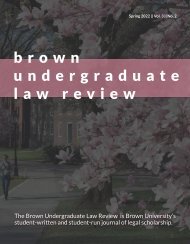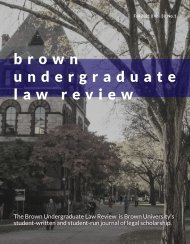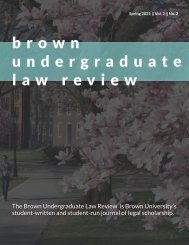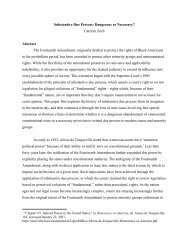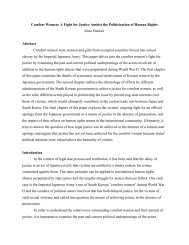From Frontiero to the Air Force: Citizenship and Equal Protection in U.S. Reproduction Jurisprudence
Olivia Siemens '21
Olivia Siemens '21
You also want an ePaper? Increase the reach of your titles
YUMPU automatically turns print PDFs into web optimized ePapers that Google loves.
Court’s historical propensity to expand substantive due process rights in order to nullify any
disfavored legislative enactment, he accuses the majority in Roe of “[setting] itself a question the
Constitution had not made the Court’s business.” 32 While Ely’s underlying argument regarding
the correlation of substantive due process with judicial overreach may be well-founded (see, for
example, Lochner v. New York), this point is simply incorrect. 33 The Constitution does speak to
how the Court should address the abortion question: through the Fourteenth Amendment’s Equal
Protection Clause.
Anti-abortion laws, by their very nature, restrain the liberties of female citizens while
exerting no analogous burden on male citizens. These sex-specific restrictions subject women to
the various social, financial, and political costs of carrying an unwanted pregnancy to term, a
possibility that similarly situated male citizens will never face. Consider, for example, the
prospective life choices available to Alyssa and Henry, two fictional students attending a Texas
university. They enter into a sexual relationship, and Alyssa inadvertently becomes pregnant. But
because the state has passed legislation to successfully limit the availability of abortion care,
Alyssa finds that she will be unable to gain access to a safe and legal abortion procedure. Instead,
her unplanned pregnancy results in a series of social and economic tradeoffs. She may need a
college degree to achieve her desired career goals, but if she cannot afford the cost of both tuition
and childcare, she will be forced to either drop out of school or put her child up for adoption. Her
social network may diminish as her acquaintances distance themselves from the stigma of her
out-of-wedlock pregnancy. Even if she is able to keep the baby, earn her degree, and secure
gainful employment, her future earnings are likely to suffer as a result of the “motherhood
penalty,” a driving factor in the persistent U.S. gender pay gap. 34 Taken alone, the Texas
legislature has placed an obvious—though not obviously unconstitutional—restraint on Alyssa’s
range of life choices. After all, as Ely notes, the state may as a general matter deprive citizens of
their liberty so long as the inhibition has some “rational connection” with a “permissible
governmental goal.” 35
32
Ibid., 563.
33
Lochner v. New York, 198 U.S. 45 (1905).
34
Abigail Hess, “Women’s earnings drop after having a child—but men’s do not,” CNBC, October 16, 2019,
https://www.cnbc.com/2019/10/16/womens-earnings-drop-after-having-a-childbut-mens-do-not.html.
35
Ely, “Wages,” 560.
10




